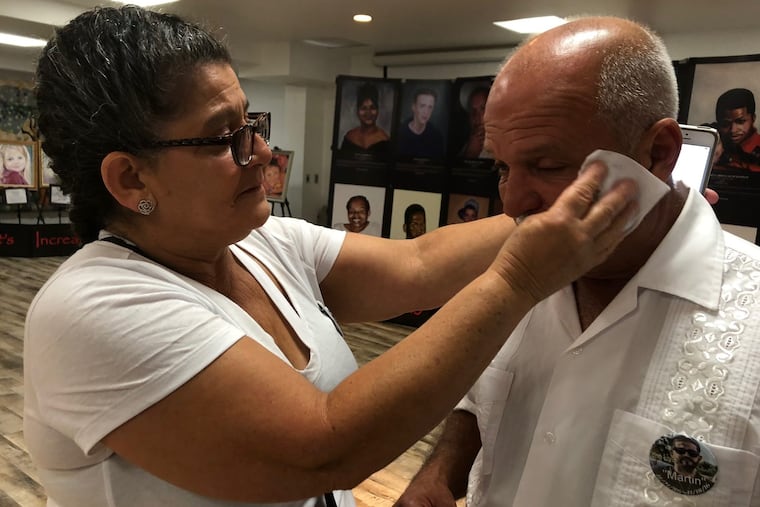Families of homicide victims, bonded by love | Helen Ubiñas
When families of homicide victims can't find justice, they turn to each other.

The little girl barreled toward the tables set up inside Liberty Lands Park as her grandparents hurried to keep up.
"Watch, watch," her grandfather's wife warned, worried she'd trip.
Barely at eye level with the taller table, the girl searched the photos on top.
"I can't see Mommy," she said, rushing around the table.
"Here, let me pick you up real quick," her grandfather said, and he bent down to scoop up the little girl.
"There's your mommy right there," he said. He gestured toward a photo of a dark-haired young woman in the middle of the table.
Stephanie Dzikowski, 22, was shot and killed in 2015 inside the home she shared with her father, Stephen Dzikowski. Early reports said she was killed in front of her daughter, Clarissa, the little girl who now searched for her mother among photos of other homicide victims.
Later, it was believed the girl, then 2, was actually in a nearby room, a small mercy, of sorts.
Her grandfather said small footprints were found in his daughter's blood.
Noticing me, the little girl got shy and sank deeper into her grandfather's arms.
“Mommy,” she said, softly, looking at the photo.
I've spent the last few weekends at events for family members of people who have been murdered in Philadelphia. At the Homicide Justice Alliance's Angel Picnic I met Clarissa, 5, and her grandfather. At Ray's Rhythm for Justice Foundation, I found myself talking to one family member after another of people whose murders have gone unsolved.
They have a lot in common, these families. Bonded by love and grief, of course. But also by the deep trauma felt by those left behind, even those as young as Clarissa, who may not remember the awful details of the day her mother died but still feels the weight of it from those around her.
She is one of the younger members of a fellowship that, at the rate of homicides in Philadelphia, will never be at a loss for members. As of July 11, 162 people have been murdered in the city.
They are family, by blood and circumstance. Sometimes both.
Take sisters Jarmari Marrero and Jessica Vega. The father of Marrero's daughter was killed in 2001. The father of Vega's children was killed in 2017. It took seven years for someone to answer for killing Marrero's daughter's father, and only because she pursued every lead, every whisper. Now one sister guides another toward justice.
In a city where nearly half of homicides go unsolved, she and others have learned that they have to push hardest for attention and answers. For some, that has meant hiring a private investigator. For others, it has meant becoming one.
"It doesn't mean that you're never going to get justice," Marrero tells her sister. "Maybe not today, maybe not tomorrow, maybe not as fast as you want it, but you can't give up."
And still, these families know it doesn't always work out, at least not immediately. Yullio Robbins is still waiting for someone to answer for gunning down her 28-year-old son James Walke III on a Germantown street in the middle of the afternoon in 2016, still pleading with anyone who knows something to talk to police, still tending to the memorial she set up on the sidewalk where her son was murdered. A memorial that sits in front of the home of another mother whose son was also murdered.
A few more years and the 2004 murder of Sophia Fleming's 17-year-old son Adam Hammer will have gone unsolved longer than he was alive.
But still she hopes. As does Waleska Angeles, whose 19-year-old son Miguel Colon was killed in 2016. And Silvia Barreto, whose 17-year-old son Andre Reyes was killed in 1996 and whose daughter Cristina Tosado was killed in 2017.
And Evelyn Martinez, whose 19-year-old daughter was killed in 2011, and so many more.
"All these people who have been killed, they were all someone's baby," Martinez said in Spanish. "I don't think people understand that … or maybe they don't care."
Maybe it's because it's so often mothers of homicide victims that I meet, women who take to the streets and courtrooms calling for justice. But the pain emanating from Victor Alicea was almost too much to bear, even for his wife, Elsa. She wiped his tears as they spoke about the unsolved murder of their 29-year-old son, Luis Alicea, shot and killed in 2016.
Alicea had children too, five of them. Children who, like Clarissa, can now find their father only in photographs.